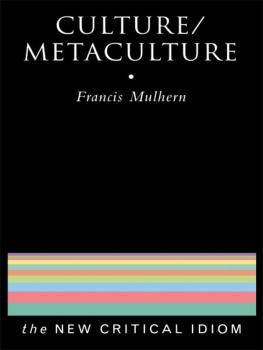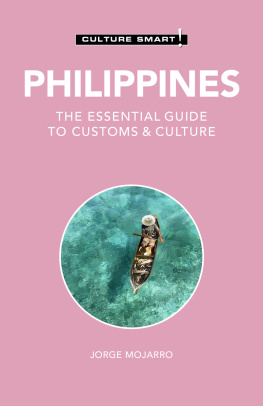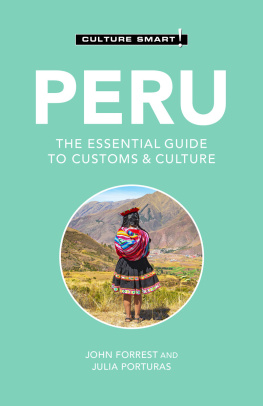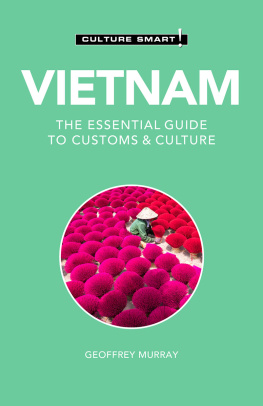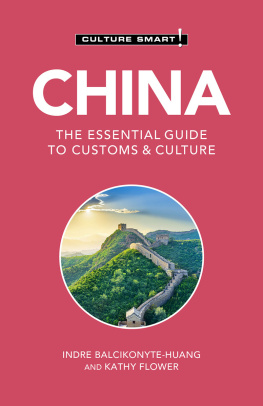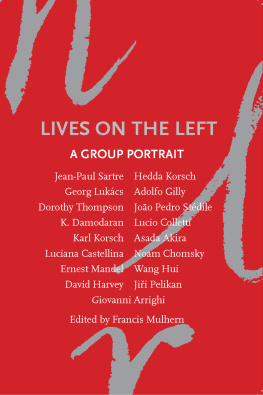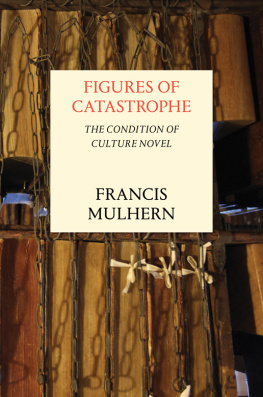Mulhern - Culture/Metaculture
Here you can read online Mulhern - Culture/Metaculture full text of the book (entire story) in english for free. Download pdf and epub, get meaning, cover and reviews about this ebook. City: London;New York, year: 2006;2010, publisher: Routledge, genre: Religion. Description of the work, (preface) as well as reviews are available. Best literature library LitArk.com created for fans of good reading and offers a wide selection of genres:
Romance novel
Science fiction
Adventure
Detective
Science
History
Home and family
Prose
Art
Politics
Computer
Non-fiction
Religion
Business
Children
Humor
Choose a favorite category and find really read worthwhile books. Enjoy immersion in the world of imagination, feel the emotions of the characters or learn something new for yourself, make an fascinating discovery.
Culture/Metaculture: summary, description and annotation
We offer to read an annotation, description, summary or preface (depends on what the author of the book "Culture/Metaculture" wrote himself). If you haven't found the necessary information about the book — write in the comments, we will try to find it.
Culture/Metaculture — read online for free the complete book (whole text) full work
Below is the text of the book, divided by pages. System saving the place of the last page read, allows you to conveniently read the book "Culture/Metaculture" online for free, without having to search again every time where you left off. Put a bookmark, and you can go to the page where you finished reading at any time.
Font size:
Interval:
Bookmark:

Culture passes into the twenty-first century as a key word in contemporary critical thought. However, it continues to mean many different things to many different people. Culture/Metaculture introduces and analyses the changing definitions of this crucial term.
The author begins by examining the European tradition of Kulturkritik, which, in the wake of the First World War, offered minority culture as the antidote to mass modernity. He then charts key challenges to this conception of culture, beginning in the 1930s and culminating in post-war theories of popular culture. This is followed by a detailed analysis of the rise of Cultural Studies. While Kulturkritik had found its version of culture in the literary canon, the discipline of Cultural Studies grew up around discussions of the media, contemporary politics, ethnicity and Marxism. The work concludes with a brilliant discussion of metaculture, or the ways in which culture, however defined, speaks of itself.
Francis Mulherns interdisciplinary study reveals fascinating links between key political issues and the many definitions of culture. The result is an unrivalled introduction to a concept at the very heart of the new critical idiom.
Francis Mulhern is Professor of Critical Studies at Middlesex University, UK. He is author of The Moment of Scrutiny (1979) and The Present Lasts a Long Time (1998).
The New Critical Idiom is an invaluable series of introductory guides to todays critical terminology. Each book:
- provides a handy, explanatory guide to the use (and abuse) of the term
- offers an original and distinctive overview by a leading literary and cultural critic
- relates the term to the larger field of cultural representation.
With a strong emphasis on clarity, lively debate and the widest possible breadth of examples, The New Critical Idiom is an indispensable approach to key topics in literary studies.
Other books in this series:
Colonialism/Postcolonialism by Ania Loomba
Discourse by Sara Mills
Gothic by Fred Botting
Historicism by Paul Hamilton
Humanism by Tony Davies
Ideology by David Hawkes
Intertextuality by Graham Allen
Literature by Peter Widdowson
Metre, Rhythm and Verse Form by Philip Hobsbaum
Myth by Laurence Coupe
Pastoral by Terry Gifford
Romanticism by Aidan Day
Sexuality by Joseph Bristow
Stylistics by Richard Bradford
The Unconscious by Antony Easthope

First published 2000
by Routledge
11 New Fetter Lane, London EC4P 4EE
Simultaneously published in the USA and Canada
by Routledge
29 West 35th Street, New York, NY 10001
Routledge is an imprint of the Taylor & Francis Group
This edition published in the Taylor & Francis e-Library, 2001.
2000 Francis Mulhern
The right of Francis Mulhern to be identified as the Author of this Work has been asserted by him in accordance with the Copyright, Designs and Patents Act 1988
All rights reserved. No part of this book may be reprinted or reproduced or utilized in any form or by any electronic, mechanical, or other means, now known or hereafter invented, including photocopying and recording, or in any information storage or retrieval system, without permission in writing from the publishers.
British Library Cataloguing in Publication Data
A catalogue record for this book is available from the British Library
Library of Congress Cataloging in Publication Data
Mulhern, Francis.
Culture/metaculture / Francis Mulhern.
p. cm
Includes bibliographical references and index.
1. Culture. I. Title.
HM621 .M85 2000
306dc21 99-054750
ISBN 0-415-10229-4 (hbk)
ISBN 0-415-10230-8 (pbk)
ISBN 0-203-12982-2 Master e-book ISBN
ISBN 0-203-17604-9 (Glassbook Format)
The New Critical Idiom is a series of introductory books which seeks to extend the lexicon of literary terms, in order to address the radical changes which have taken place in the study of literature during the last decades of the twentieth century. The aim is to provide clear, well-illustrated accounts of the full range of terminology currently in use, and to evolve histories of its changing usage.
The current state of the discipline of literary studies is one where there is considerable debate concerning basic questions of terminology. This involves, among other things, the boundaries which distinguish the literary from the non-literary; the position of literature within the larger sphere of culture; the relationship between literatures of different cultures; and questions concerning the relation of literary to other cultural forms within the context of interdisciplinary studies.
It is clear that the field of literary criticism and theory is a dynamic and heterogeneous one. The present need is for individual volumes on terms which combine clarity of exposition with an adventurousness of perspective and a breadth of application. Each volume will contain as part of its apparatus some indication of the direction in which the definition of particular terms is likely to move, as well as expanding the disciplinary boundaries within which some of these terms have been traditionally contained. This will involve some re-situation of terms within the larger field of cultural representation, and will introduce examples from the area of film and the modern media in addition to examples from a variety of literary texts.
John Drakakis generously invited me to write this book, and still more generously bore with my tardiness in completing it; for this and for his critical encouragement and advice, my warm thanks to him.
Some parts of the book, and versions of its general argument, were first aired in seminar papers; for these opportunities I have to thank Mick Jardine, Maria Elisa Cevasco and Tadhg Foley, and their respective colleagues at King Alfreds University College, Winchester, the University of So Paulo, and the National University of Ireland, Galway.
Pilot versions of the general argument appeared in Travesia (now Journal of Latin American Cultural Studies) and Monthly Review. I am grateful to the editors of those journals, and particularly to John Kraniauskas and Ellen Meiksins Wood. I have reiterated some of the material of A welfare culture?, published in Radical Philosophy 77, MayJune 1996, for which I thank the editors.
Rachel Malik and Peter Osborne have been models of critical support: to them, my special thanks.
Culture has long been said to be a rare and a vulnerable thing, but no one could speak likewise of the discussion it inspires, which, in contrast, has never been more prolific or robust. Familiar modern understandings of the term persist, more or less strongly: culture as a storehouse of essentially human or essentially national values. But they persist now in more or less radical tension with the newer understanding of culture as the ordinary social, historical world of sense, of symbolic or meaning-bearing activity in all its forms. Culture in that expanded, secular definition has imprinted itself on a whole range of disciplines: history and sociology, for example, and literary studies, where the older meanings have been fundamental, and above all Cultural Studies itself. It follows that no one venturing to add a further volume to the library of contemporary writing in the area should expect the hospitality once readily accorded to travellers from faraway places. Readers will wish to know in what this book differs from others near to hand. My subject is the discussion itself, culture as a topic in twentieth-century debate, in Europe and particularly in Britain.
Font size:
Interval:
Bookmark:
Similar books «Culture/Metaculture»
Look at similar books to Culture/Metaculture. We have selected literature similar in name and meaning in the hope of providing readers with more options to find new, interesting, not yet read works.
Discussion, reviews of the book Culture/Metaculture and just readers' own opinions. Leave your comments, write what you think about the work, its meaning or the main characters. Specify what exactly you liked and what you didn't like, and why you think so.

